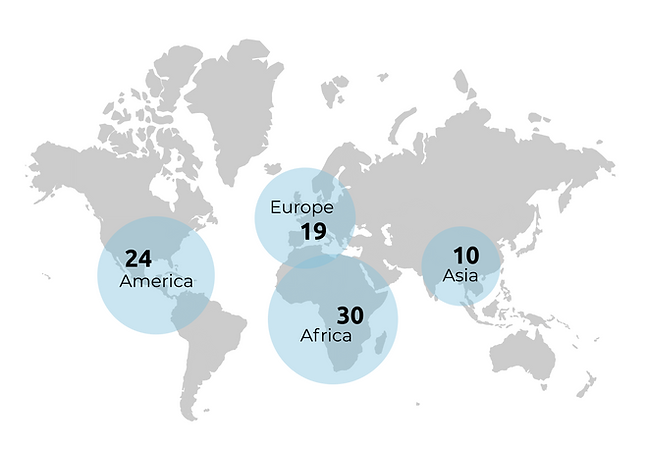
Origin of the project:
Worldwide, unprecedented urban development involves an increase or resurgence of many diseases (dengue, Zika, etc.) caused by various vectors, such as mosquitoes. Thus, understanding this phenomenon more clearly is urgent, but containing it more effectively and faster is also crucial. However, while the experiential knowledge of all those involved in and affected by this battle is essential, it is also very important to update the most recent evidence produced by expert scientists on the subject. Thus, in 2016, TDR (the Special Programme for Research and Training in Tropical Diseases (TDR), co-sponsored by UNICEF/UNDP/World Bank/WHO) selected a consortium of researchers coordinated by Valéry Ridde to produce a state of scientific knowledge review (VERDAS consortium).
%20Jean-Jacques%20Lemasson-1-web.jpg)
Process
Decision-makers and stakeholders were involved from the beginning of the project to identify their knowledge needs and to ensure that this state of knowledge review truly answers the questions they ask. About 100 people (39 decision-makers, 41 researchers and 3 people from the private sector) from almost every continent were involved remotely to help researchers target themes that required rigorous syntheses of available scientific data.

These syntheses have resulted in the publication of a series of scientific articles in a special issue of the journal Infectious Diseases of Poverty, available free of charge. Before being published, these scientific articles were evaluated by other researchers with subject-area expertise, one indication of the high quality of their content.
However, research has long shown that scientific articles are not the only tools to support evidence-based decision-making. It is therefore essential to produce other tools that are more adapted and more oriented towards decision-making. Research briefs are a useful and effective tool for informing policy and practice.
Thus, the consortium of researchers organized two workshops (in Colombia in March 2017 and in France in August 2019), attended by about ten decision-makers and speakers from Africa and Latin America to work collectively to produce research briefs from these scientific articles. Researchers, decision-makers and stakeholders were first trained in March 2017 in the production of this type of brief by a knowledge transfer expert from the team (Christian Dagenais of the RENARD Team). Then, collectively and depending on the themes addressed in each of the six scientific articles, they wrote a research brief. Each brief was commented on by Christian Dagenais, Valéry Ridde and the scientist responsible for monitoring the project at TDR/WHO, Mariam Otmani del Barrio. The last workshop in August 2019, organized with a partner NGO - SOLTHIS, brought together new researchers, decision-makers and stakeholders to collectively improve and finalize the six research briefs after peer review.

VERDAS
Consortium
© IRD – Anna Surinyach

Six research briefs
It is therefore with great pleasure that we have now made the six research briefs resulting from this synthesis work available to everyone. They have been written with accessibility in mind, keeping jargon to a minimum and, where possible, emphasizing action and support for decision-making. International, regional and national decision-makers will find ways to guide public policies and standards. Technical and financial partners may find funding needs for research and action. Field-based practitioners will be able to identify actions that are more effective than others for implementation in their contexts. These briefs are drawn from knowledge syntheses from before 2017, but their content is clearly still relevant. Of course, given the variety of topics covered in the six syntheses, not everything could be summarized in these briefs nor was it possible to always suggest ways to guide decision-making. But we believe that making them available in accessible language through collaborative writing by researchers, decision-makers and stakeholders was essential to the success and finalization of our project. Scientific articles cannot be an end in themselves, even if we have put them online for free. Thus, we hope that these six briefs will be useful and that their online availability will reach a wide audience.
We encourage all those involved in the fight against these vector-borne diseases to share and discuss these briefs in order to inform their thinking and decision-making.
The six briefs are:
2- Integrated surveillance systems to cut off vector-borne diseases in cities
3- Integrated vector management implementation in disease-endemic areas to reduce mosquito population
4- Global threat of vector-borne diseases transmission and co-infection in urban areas
6- Challenges in housing/hygiene interventions in the prevention/control of vector-borne diseases
Acknowledgements
These briefs were written collectively. Each brief was written under the leadership of the person who coordinated each article in the special issue of Infectious Diseases of Poverty. We chose not to sign the briefs and to leave the signature to the collective—the VERDAS consortium.

The entire project, the production of the special issue of the journal and the six research briefs involved numerous people. In addition to all the international experts who agreed to participate anonymously in the initial prioritization exercise, we would like to thank the following individuals:
Lyda Osorio, Florence Fournet, Clara Bermudez, Celina Turchi, Mabel Carabali, Roch Dabire, Valéry Ridde, Emmanuel Bonnet, Fanny Cortes, Georges Dimech, Freddy Cordoba, Brice Bicaba, Boukary Ouedraogo, Mariam Otmani del Barrio, Stéphanie Degroote, Etienne Guillard, Franck Lamontagne, Sofia Meister, Brittany Cobb, Maeva Boileau, Sarah Louart, Frédéric Simard, Andrea Caprara, Frédéric Jourdain, Kate Zinszer, Laurence Campeau, Marcus Eder, Noêmia Teixeira de Siqueira Filha, Giovanny Vinícius Araújo de França, Cynthia Braga, Jonny Alejandro Garcia, Luis Gabriel Parra, Victor Garcia, Laura Torres, Jorge Marcos-Marcos, Antonio Olry de Labry-Lima, Silvia Toro-Cardenas, Marina Lacasaña, Perig Bouju, Christian Dagenais, Lucie Lechat, Carmen Sinti Hesse, Beatriz Parra

